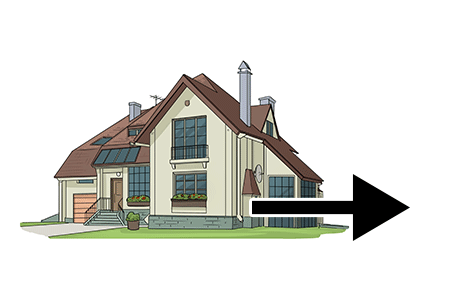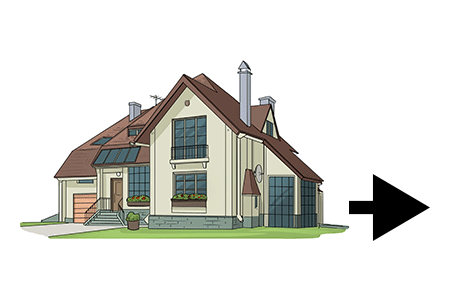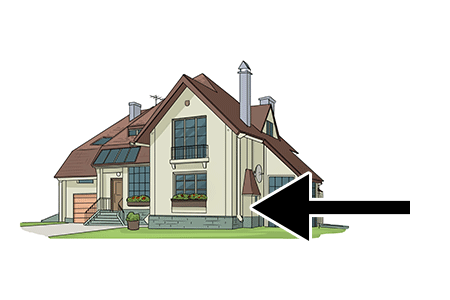Parts of speech and inflexion
The Slovak language distinguishes six cases that are traditionally numbered as follows:
- 1st case - nominative (N)
- 2nd case - genitive (G)
- 3rd case - dative (D)
- 4th case - accusative (A)
- 6th case - locative (L)
- 7th case - instrumental (I)
The fifth case (vocative) is currently seldom used. It was replaced by the nominative in the function of address.
Ako sa máte, pán Kováč? Kde bývaš, Zuzka? Otec, kedy prídeš?
Only a few forms of the vocative are preserved and used:
Nominative
The nominative is the first case in Slovak. The nominative is always indicated in dictionaries as the basic form of a declined word. It answers the question: kto? čo?
The subject of a sentence is generally in the nominative case.
Tá žena je pekná. Žiak píše úlohu. Slovensko leží v strednej Európe.
The nominative is also used to greet or call out to people (the nominative has almost completely replaced the old fifth case, the vocative).
Genitive
The genitive is the second case in Slovak. We ask questions using:



The genitive is also used to express ownership:
Lenka má knihu. To je kniha Lenky. Môj otec má auto. To je auto môjho otca.
Lenka →To je dom Lenky. Peter →To je auto Petra. žiak →To je zošit žiaka. priatelia →To sú knihy priateľov. môj priateľ →To je pes môjho priateľa.
See also: Declension of personal pronouns
Dative
The dative is the third case in Slovak. We ask questions using:
Accusative
The accusative is the fourth case in Slovak, and one of the most frequently used. It denotes a direct object (i.e. the thing affected by the verb's action). It is combined with verbs such as
Peter, čo vidíš na tejto fotografii? Je tam môj otec, moja mama a naše auto. (N)Vidím môjho otca, moju mamu a naše auto. (A)Sú tam jeho študenti, jej deti a ich knihy. (N)Vidím jeho študentov, jej deti a ich knihy. (A)Kde je moja kniha? (N)Ja mám tvoju knihu. (A)Čo robíš? Robím domácu úlohu. (A)
Locative
The locative is the sixth case in Slovak. We ask questions using:
The locative is ALWAYS combined with a preposition. It is a prepositional case.
Rozprávame sa o prázdninách. Kde je Zuzka? Zuzka je v škole. Na námestí sa koná koncert. Kde bývaš? Bývam v Bratislave.
It is also used for expressing time:
Ráno vstávam o siedmej. O dvanástej obedujeme. Prídem po piatej hodine.
Instrumental
The instrumental is the seventh case in Slovak. We ask questions using:
The instrumental without a preposition (
byť niečím/niekým stať sa niečím/niekým zaoberať sa niečím/niekým živiť sa niečím inšpirovať sa niečím/niekým cestovať niečím platiť niečím prekvapiť niečím zásobovať niečím pokrývať niečím dláždiť niečím zabávať niečím
Čím cestuješ do školy? Cestujem autobusom/vlakom/električkou. Môžem platiť kreditnou kartou? Po meste turisti cestujú taxíkmi. Píšeme farebnými ceruzkami. Nejedz rukami. Deti sa utierajú uterákmi. Nezaoberáme sa parciálnymi problémami. Študenti prekvapili originálnymi nápadmi. Inšpiruje sa bojovými umeniami. Bufet zásobujeme minerálkami.
The instrumental can be combined with prepositions:
S kým ideš do mesta? Idem s bratom. Karol sa stretol s priateľmi. Rozprávam sa so spolužiakmi. Dieťa sa hrá s hračkami. Rozprávame sa s priateľmi a kamarátmi pri káve. Parkujeme pred vašimi oknami. Nové obchodné centrum stavajú za záhradami. Pod nohami máme pevnú zem. Vietor zúril nad lesmi a horami. Medzi domami je krásny park.
We must distinguish between:
S kým ideš do školy? S priateľmi. =Ja a priatelia ideme do školy. -
Čím/ako ideš do školy? Autobusom. =Ja idem do školy autobusom. = by bus
The proposition //s// has a vocalised version in front of words beginning in //s, š, z, ž// (to make the pronunciation easier). The vocalised preposition //so// is pronounced [zo], e.g.:
so svetrom [zo svetrom] so školou [zo školou] so záhradou [zo záhradou] so žiakmi [zo žiakmi]
The prepositions //pod, nad, pred, za, medzi// have a spatial meaning. They are use with the instrumental when they mean a fixed place. The prepositions //pred// and //medzi// also have a temporal meaning:
Prišla som skoro, ešte pred študentkami. Medzi štvrtou a šiestou (hodinou) sme boli na večeri.